(完整word版)高中英语动词用法详解
(完整word版)情态动词can(could),may(might)的用法
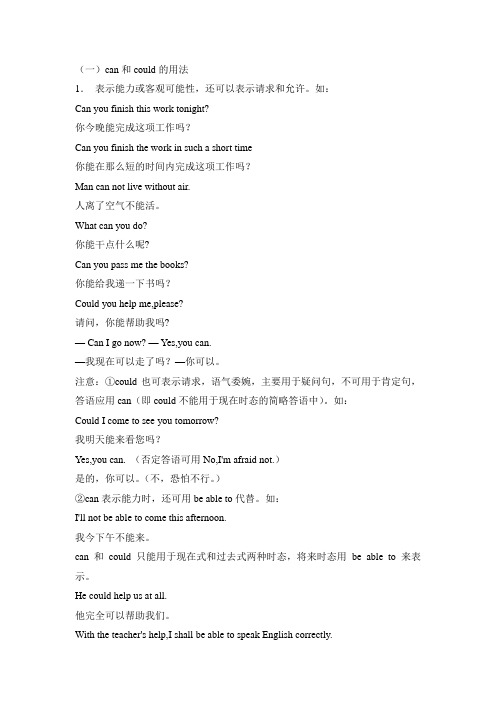
(一)can和could的用法1.表示能力或客观可能性,还可以表示请求和允许。
如:Can you finish this work tonight?你今晚能完成这项工作吗?Can you finish the work in such a short time你能在那么短的时间内完成这项工作吗?Man can not live without air.人离了空气不能活。
What can you do?你能干点什么呢?Can you pass me the books?你能给我递一下书吗?Could you help me,please?请问,你能帮助我吗?— Can I go now? — Yes,you can.—我现在可以走了吗?—你可以。
注意:①could也可表示请求,语气委婉,主要用于疑问句,不可用于肯定句,答语应用can(即could不能用于现在时态的简略答语中)。
如:Could I come to see you tomorrow?我明天能来看您吗?Yes,you can. (否定答语可用No,I'm afraid not.)是的,你可以。
(不,恐怕不行。
)②can表示能力时,还可用be able to代替。
如:I'll not be able to come this afternoon.我今下午不能来。
can 和could 只能用于现在式和过去式两种时态,将来时态用be able to 来表示。
He could help us at all.他完全可以帮助我们。
With the teacher's help,I shall be able to speak English correctly.由于老师的帮助,我将能准确地讲英语。
2. “can”表达推测例:Can the news be true? 这消息会是真的吗?The news can't be true. 这消息不会是真的吧。
高中英语动词的时态和语态用法详解-文档.
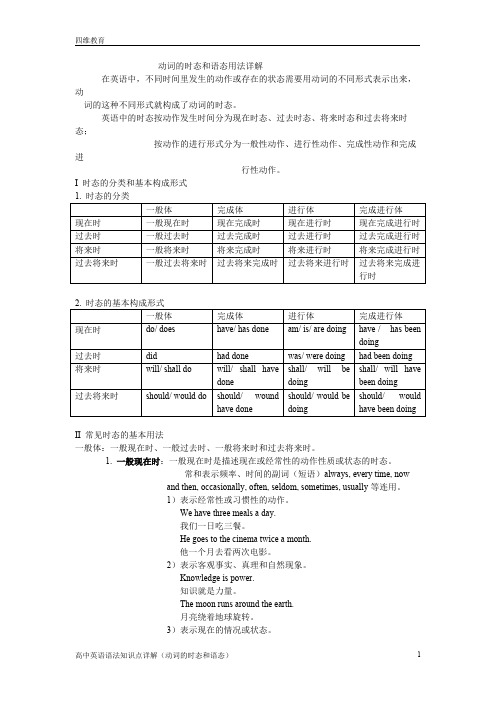
给大家推荐一个英语微信群-Empty Your Cup
英语微信群是目前学习英语最有效的方法,群里都是说英语,没有半个中文,而且规则非常严格,是一个超级不错的英语学习环境,群里有好多英语超好的超牛逼的人,还有鬼佬和外国美眉。
其实坦白说,如果自己一个人学习英语太孤独,太寂寞,没有办法坚持,好几次都会半途而废。
只要你加入到那个群里以后,自己就会每天都能在群里坚持学,坚持不停地说和练,由于是付费群,群里的成员学习氛围非常强,每天的训练度都非常猛,本来很懒惰的你一下子就被感染了,不由自主地被带动起来参与操练,不好意思偷懒,别人的刻苦学习精神会不知不觉影响你,Empty Your Cup英语微信群(进群加喂新 601332975)可以彻底治好你的拖延症,里面学员都非常友好,总是给你不断的帮助和鼓励,让你在学英语的路上重新燃起了斗志,因为每天都在运用,你的英语口语就能得到了迅猛的提升,现在可以随便给一个话题,都能用英文滔滔不绝的发表5分钟以上对这个话题的看法和观点,想提高英语口语的 可以加入进来,It really works very well.。
高中英语动词用法详解-文档
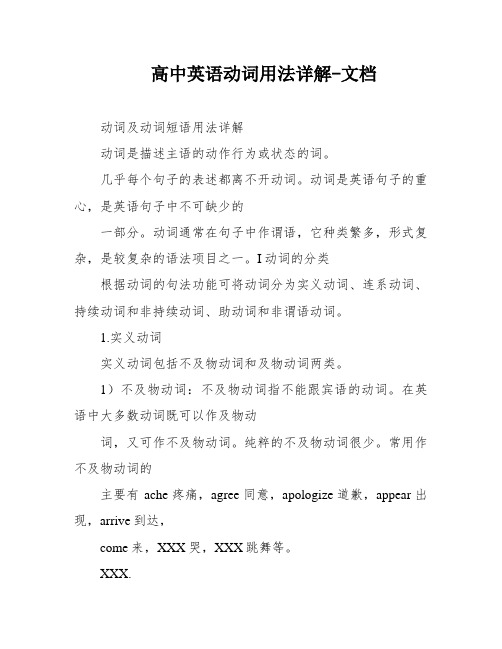
高中英语动词用法详解-文档动词及动词短语用法详解动词是描述主语的动作行为或状态的词。
几乎每个句子的表述都离不开动词。
动词是英语句子的重心,是英语句子中不可缺少的一部分。
动词通常在句子中作谓语,它种类繁多,形式复杂,是较复杂的语法项目之一。
I动词的分类根据动词的句法功能可将动词分为实义动词、连系动词、持续动词和非持续动词、助动词和非谓语动词。
1.实义动词实义动词包括不及物动词和及物动词两类。
1)不及物动词:不及物动词指不能跟宾语的动词。
在英语中大多数动词既可以作及物动词,又可作不及物动词。
纯粹的不及物动词很少。
常用作不及物动词的主要有ache疼痛,agree同意,apologize道歉,appear出现,arrive到达,come来,XXX哭,XXX跳舞等。
XXX.我们一直等到妈妈来。
2)及物动词:能跟宾语的动词称为及物动词。
英语中的动词大多数为及物动词。
(1)跟单宾语的及物动词只跟一个宾语的动词称为单宾语动词。
常见的单宾语动词主要有:accept接受,admire羡慕,admit承认,affect影响,afford买得起,announce公布,borrow借出,XXX埋等。
I'm sorry that I XXX.对不起我忘了你的电话号码。
(2)跟双宾语的及物动词可以同时跟两个宾语的及物动词叫双宾语动词。
双宾语中的一个宾语指人,称为间接宾语,一个宾语指物,称为间接宾语。
间接宾语普通位于直接宾语之前,也可位于其后,但此时在间接宾语的前面需加介词to或for。
直、间接宾语易位需加to的动词介词to侧重指动作的方向,表示朝着、向着、对着某人。
常见的此类动词有:tell通知,XXX借等。
Hand me that book, please.= Hand that book to me, please.请把那本书递给我。
直、间接宾语易位需加for的动词介词for侧重指动作的受益者,透露表现为或人、替或人。
(word完整版)高中英语句子翻译与写作第3章动词不定式
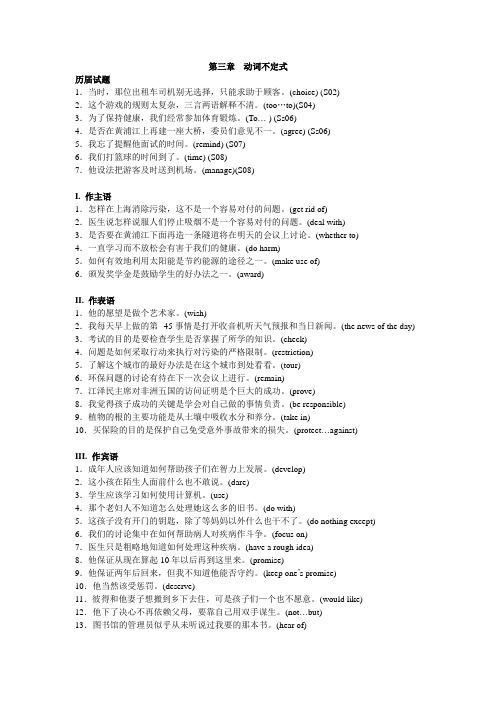
第三章动词不定式历届试题1.当时,那位出租车司机别无选择,只能求助于顾客。
(choice) (S02)2.这个游戏的规则太复杂,三言两语解释不清。
(too…to)(S04)3.为了保持健康,我们经常参加体育锻炼。
(To… ) (Ss06)4.是否在黄浦江上再建一座大桥,委员们意见不一。
(agree) (Ss06)5.我忘了提醒他面试的时间。
(remind) (S07)6.我们打篮球的时间到了。
(time) (S08)7.他设法把游客及时送到机场。
(manage)(S08)I. 作主语1.怎样在上海消除污染,这不是一个容易对付的问题。
(get rid of)2.医生说怎样说服人们停止吸烟不是一个容易对付的问题。
(deal with)3.是否要在黄浦江下面再造一条隧道将在明天的会议上讨论。
(whether to)4.一直学习而不放松会有害于我们的健康。
(do harm)5.如何有效地利用太阳能是节约能源的途径之一。
(make use of)6.颁发奖学金是鼓励学生的好办法之一。
(award)II. 作表语1.他的愿望是做个艺术家。
(wish)2.我每天早上做的第--45事情是打开收音机听天气预报和当日新闻。
(the news of the day) 3.考试的目的是要检查学生是否掌握了所学的知识。
(check)4.问题是如何采取行动来执行对污染的严格限制。
(restriction)5.了解这个城市的最好办法是在这个城市到处看看。
(tour)6.环保问题的讨论有待在下一次会议上进行。
(remain)7.江泽民主席对非洲五国的访问证明是个巨大的成功。
(prove)8.我觉得孩子成功的关键是学会对自己做的事情负责。
(be responsible)9.植物的根的主要功能是从土壤中吸收水分和养分。
(take in)10.买保险的目的是保护自己免受意外事故带来的损失。
(protect…against)III. 作宾语1.成年人应该知道如何帮助孩子们在智力上发展。
(完整word版)常考功能动词总结

(完整word版)常考功能动词总结G开头的功能动词:介词+动名词+动词in Gang kommen /开始运行etw。
in Gang setzen /使运作,使启动etw。
in Gebrauch nehmen= gebrauchen利用,使用auf einen Gedanken kommen /得出一个想法ins Gedränge geraten /陷入窘境jn in Gefahr bringen= gefährden置人于险境in Gefahr geraten= ge fährdet werden陷入险境in Gefangenschaft sein= gefangen sein被俘(状态)in Gefangenschaft geraten= gefangen werden被俘(过程)jn außer Gefecht setzen /使失去战斗力etw. ins Gefecht führen /提出辩论im Gegensatz stehen= gegensätzlich sein与……对立,矛盾etw. zur Geltung bringen /使发挥作用auf den Geschmack kommen /对……逐渐感兴趣ins Gespräch kommen= sprechen开始交谈aus dem Gleichgewicht kommen /失去平衡G开头的功能动词:动名词+动词+介词Gebrauch machen+von= gebrauchen使用sich Gedanken machen+über= denken考虑,对……的想法(完整word版)常考功能动词总结Gefallen finden+an= gefallen喜欢ein Gefühl haben+von= fühlen有……的感觉die Garantie bekommen+auf= garantiert werden得到担保die Garantie geben+auf= garantieren给予保修Gerechtigkeit üben+gegen= gerecht sein对……公正Gespräch führen+mit= sprechen进行谈话Gewicht legen+auf /重视Groll hegen+auf= gerollen恼怒,心怀恼火H,I,J开头的功能动词:介词+动名词+动词jn in Haft nehmen= verhaften拘捕in Haft sein/sich in Haft befinden= verhaftet sein在押jn/etw。
动词八大时态用法以及练习总结精华(可编辑修改word版)

一般现在时态一、一般现在时的用法:1、表示经常或者反复发生的动作. 如: 我每天吃午饭. I have lunch every day.2、还表示现在存在的一种状态. 如:我姐姐是一位老师.My sister is a teacher.3、客观真理,客观存在,科学事实。
例如:The earth moves around the sun.地球绕着太阳转。
二、一般现在时态经常与often(经常)sometimes(有时)always(总是)usually (通常)等频率词连用,也经常与every day(每天), every week(每周), every month(每月), every term(每学期), every year(每年), once a week (一周一次),twice a year(一年两次)等表示时间的词连用。
三、第三人称单数问题一般现在时中,当主语是第三人称单数时,即常在动词原形后加-s 或-es。
四、一般现在时分类:1.一般现在时态分为be 动词的一般现在时。
1)be 动词包括am,is,are. 中文为"是",这三个词的用法要随着主语的变化而变化。
"am" 用于第一人称单数(I); "is" 用于第三人称单数(he,she,it); "are "用于第一人称复数(we),第二人称单数和复数(you), 第三人称复数(they)。
可以记住以下顺口溜:am 管"我",is 管",她,它,他",are 管"大家"。
一般疑问句和否定句:把be 动词"am,is,are" 放在句首,回答时也要使用be 动词;变为否定句时,把表示否定的not 放在"am is are" 的后面, 其中可以简写为:is not---- isn't ;are not---- aren't;am not 没有简写形式。
高考英语必考语法精讲精练专题八:动词的时态和语态 Word版含解析
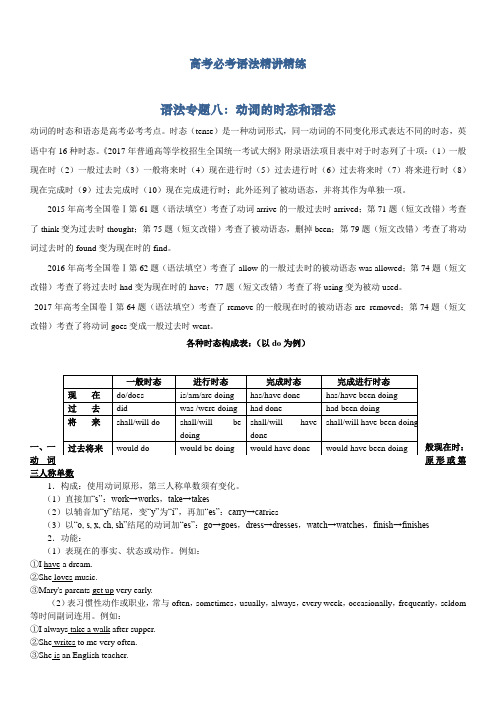
高考必考语法精讲精练语法专题八:动词的时态和语态动词的时态和语态是高考必考考点。
时态(tense)是一种动词形式,同一动词的不同变化形式表达不同的时态,英语中有16种时态。
《2017年普通高等学校招生全国统一考试大纲》附录语法项目表中对于时态列了十项:(1)一般现在时(2)一般过去时(3)一般将来时(4)现在进行时(5)过去进行时(6)过去将来时(7)将来进行时(8)现在完成时(9)过去完成时(10)现在完成进行时;此外还列了被动语态,并将其作为单独一项。
2015年高考全国卷Ⅰ第61题(语法填空)考查了动词arrive的一般过去时arrived;第71题(短文改错)考查了think变为过去时thought;第75题(短文改错)考查了被动语态,删掉been;第79题(短文改错)考查了将动词过去时的found变为现在时的find。
2016年高考全国卷Ⅰ第62题(语法填空)考查了allow的一般过去时的被动语态was allowed;第74题(短文改错)考查了将过去时had变为现在时的have;77题(短文改错)考查了将using变为被动used。
2017年高考全国卷Ⅰ第64题(语法填空)考查了remove的一般现在时的被动语态are removed;第74题(短文改错)考查了将动词goes变成一般过去时went。
各种时态构成表:(以do为例)一、一般现在时:动词原形或第三人称单数1.构成:使用动词原形,第三人称单数须有变化。
(1)直接加“s”:work→works,take→takes(2)以辅音加“y”结尾,变“y”为“i”,再加“es”:carry→car ries(3)以“o, s, x, ch, sh”结尾的动词加“es”:go→goes,dress→dresses,watch→watches,finish→finishes2.功能:(1)表现在的事实、状态或动作。
例如:①I have a dream.②She loves music.③Mary's parents get up very early.(2)表习惯性动作或职业,常与often,sometimes,usually,always,every week,occasionally,frequently,seldom 等时间副词连用。
(完整版word)非谓语动词用法总结及解析
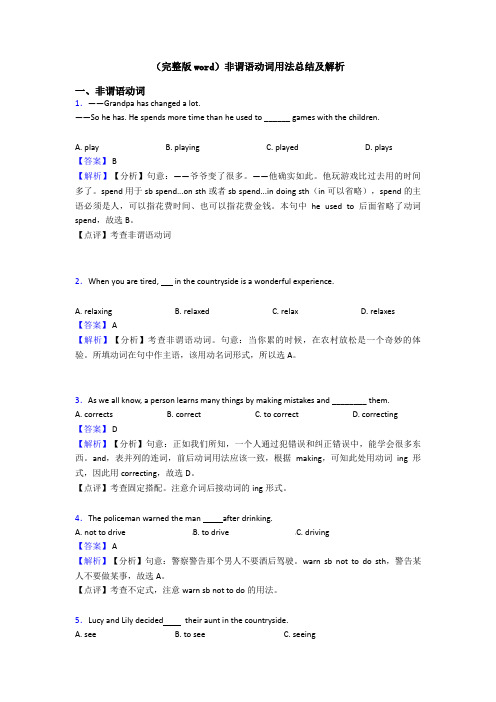
(完整版word)非谓语动词用法总结及解析一、非谓语动词1.——Grandpa has changed a lot.——So he has. He spends more time than he used to ______ games with the children.A. playB. playingC. playedD. plays【答案】 B【解析】【分析】句意:——爷爷变了很多。
——他确实如此。
他玩游戏比过去用的时间多了。
spend用于sb spend...on sth或者sb spend...in doing sth(in可以省略),spend的主语必须是人,可以指花费时间、也可以指花费金钱。
本句中he used to后面省略了动词spend,故选B。
【点评】考查非谓语动词2.When you are tired, in the countryside is a wonderful experience.A. relaxingB. relaxedC. relaxD. relaxes【答案】 A【解析】【分析】考查非谓语动词。
句意:当你累的时候,在农村放松是一个奇妙的体验。
所填动词在句中作主语,该用动名词形式,所以选A。
3.As we all know, a person learns many things by making mistakes and ________ them.A. correctsB. correctC. to correctD. correcting【答案】 D【解析】【分析】句意:正如我们所知,一个人通过犯错误和纠正错误中,能学会很多东西。
and,表并列的连词,前后动词用法应该一致,根据making,可知此处用动词ing形式,因此用correcting,故选D。
【点评】考查固定搭配。
注意介词后接动词的ing形式。
4.The policeman warned the man after drinking.A. not to driveB. to driveC. driving【答案】 A【解析】【分析】句意:警察警告那个男人不要酒后驾驶。
- 1、下载文档前请自行甄别文档内容的完整性,平台不提供额外的编辑、内容补充、找答案等附加服务。
- 2、"仅部分预览"的文档,不可在线预览部分如存在完整性等问题,可反馈申请退款(可完整预览的文档不适用该条件!)。
- 3、如文档侵犯您的权益,请联系客服反馈,我们会尽快为您处理(人工客服工作时间:9:00-18:30)。
高中英语动词用法详解1 动词原形及不定式的用法I动词原形的用法:1.除单三人称的一般现在时,其它人称作主语,动词用原形。
2.将来时态shall, will, should, would之后用动词原形。
3.祈使句句子开头用动词原形。
4.助动词do, does, did之后用动词原形。
5.情态动词can、could、may, might, have/has to, must, need, dare ,ought to之后用动词原形。
6.使役动词let、make、have 之后用动词原形。
7.感官动词see、watch、notice、hear、feel、find之后用动词原形(说明动作已经结束)。
8.had better 之后用动词原形。
9.why / why not 之后用动词原形。
10.would rather do sth . than do sth .11.prefer to do sth. rather than do sth./ prefer doing sth. to doing sth.help sb. do sth.II.动名词的用法:介词之后动词要用动名词形式(动词+ing)部分动词之后的动词只能用动名词形式:enjoy, finish, practice, mind, spend, dislike, find , keep部分短语后省略了介词in: have fun/ problems/ difficulties/ trouble /a good time doing be busy doing ,be worth doing , can’t help doing , feel like doing , do some doing sth.下面这些动词既可跟动名词又可跟不定式:like / love / hate doing (doing表示习惯)(to do表示具体的动作)stop doing(表示停止)(doing表示开始做不定式的动作);remember , forget (不定式表示未做;动名词表示已做);try (doing表示试着做;to do表示努力做);go on (doing继续做相同的事to do继续做不同的事)begin , start (to do与doing区别不大);need (人作主语用to do ;物作主语用doing表示被动);mean(人作主语用to do表示“打算做”;事/ 物作主语用doing表示“意味着”);这些动词既可跟动词原形,又可跟ing形式:see,watch,hear.notice (用原形是指动作结束,ing表示动作正在进行)go swimming/cleaning/fishing/skating/skiing….No parking/swimming/spitting…..do some cleaning/washing/reading…III.动词不定式的用法:1.ask/tell/want/order/teach/wish/would like/invite/encourage sb. to do sth.2.ask/tell/want/order/teach/wish/would like/invite/encourage sb. not to do sth.3.Help...(to) do sth.4、主系表+ 不定式(to do)5.主系表+for sb + 不定式(to do)6.部分动词既可跟动名词又可跟不定式:(同动名词6)7.疑问词+不定式(to do)可以把复合句变为简单句,(to = 主语+will/would/can)IV.动词单三(动词+s / es)用于第三人称单数作主语的一般现在时态。
V.过去式用于一般过去时。
VI.过去分词用于完成时和被动语态VII.现在分词用于进行时。
2 英语动词双写规则及常见动词英语动词双写规则必须同时满足以下 4 个条件:1) 该动词的发音以重读闭音节结尾;重读闭音节就是指在一个音节中,元音字母不是发它本身的字母音,以辅音字母结尾,而且是重读音节的音节。
比如apple划音节就应该是ap/ple前面那个ap 是一个音节以辅音字母结尾就是闭音节。
2)结尾闭音节符合“1 个辅音字母+ 1 个元音字母+ 1 个辅音字母”3)结尾的辅音字母不是"x";4)该动词的拼写规则没有例外;如:sit---sittingbegin---beginning(重读在gin这个音节上,相当与把gin改成双写的)像travel这种重读不在的vel,可以为travelled,也可以是traveled.举两个很经典的例子:forbid---forbidding (重读闭音节,双写)prohibit---prohibiting (重读在第二音节,非重读闭音节,不双写)元音:a e i o u辅音:b d g v r z n p m t c k g f l s h j x半元音:r y w常见的须双写的动词:babysit-babysitting-babysat-babysat 临时照看婴儿ban-banning-banned-banned禁止bar-barring-barred-barred闩住;禁止bat-batting-batted-batted击球beg-begging-begged-begged乞求,乞讨begin-beginning-began-begun 开始chat-chatting-chatted-chatted聊天clap-clapping-clapped-clapped拍掌,拍打commit-committing-committed-committed犯(罪),委托control-controlling-controlled-controlled控制cut-cutting-cut-cut切dam-damming-dammed-dammed筑坝,拦住dip-dipping-dipped-dipped浸,沾dot-dotting-dotted-dotted点缀drag-dragging-dragged-dragged拖,拉drop-dropping-dropped-dropped掉落equip-equipping-equipped-equipped配备fan-fanning-fanned-fanned扇…,煽动fit-fitting-fitted-fitted适合forget-forgetting-forgot-forgotten忘记fret-fretting-fretted-fretted使烦恼get-getting-got-got 得到,获得hit-hitting-hit-hit 打,击,撞hug-hugging-hugged-hugged拥抱jam-jamming-jammed-jammed挤塞,塞满jog-jogging-jogged-jogged慢跑kidnap-kidnapping-kidnapped-kidnapped绑架let-letting-let-let 让mop-mopping-mopped-mopped(用拖把)拖nap-napping-napped-napped 小睡,打盹nod-nodding-nodded-nodded点头occur-occurring-occurred-occurred发生pat-patting-patted-patted轻拍3 情态助动词用法简述1 dare, need①dare作情态动词用时, 常用于疑问句、否定句和条件从句中, 过去式形式为dared。
例How dare you say such horrible words to me?②need 作情态动词用时, 常用于疑问句、否定句,相当于肯定句中一般用must, have to, ought to, should。
例Need I finish the work today?Yes, you must. / No, you needn’t.③dare和need作实义动词用时,有人称、时态和数的变化,在肯定句中,dare 后面常接带to的不定式,在疑问句和否定句中,dare后面可接带to或不带to 的不定式,而need后面只能接带to的不定式。
例She doesn’t dare (to)answer.She needs to cook dinner for her sisters.2 shall, should①shall 用于第一人称,征求对方的意见。
例What shall I do ?②shall 用于第二、三人称,表示说话人给对方的命令、警告、允诺或威胁。
例You shall be punished,you bad boy!3 will, would①表示请求、建议等,使用would使语气更加缓和。
例Would you give me a cup of coffee, please?②表示意志、愿望和决心。
例I will never do that again.③would表示过去反复发生的动作或某种倾向。
例During that summer, he would visit me every other day.④表示估计和猜想。
例It would be about may when she come back to China.4 should, ought to①should表示“应该”,ought to表示义务或责任,语气更严重。
例I should help her because she is in trouble.You ought to take care of her because she is your daughter.②表示劝告、建议和命令,should, ought to可通用,但在疑问句中常用should。
例Should I open the window?③表示推测,should , ought to (客观推测), must(主观推测)。
例She must pass the exam. (断定)She ought to/should pass the exam.(不太肯定)4 英语情态助动词用法详解情态助动词:用来表示说话人情绪态度的助动词,可以表示推测意义或非推测性意义,非推测性意义是指“允许、义务、意志”等意义,这些意义含有人对事件内在支配的因素,推测性意义是指“可能、必须、预测”等意义,这些意义主要不含有人对事件支配的因素,但含有人对事件可能或不可能发生作出的判断,很多动词同时具有这两种意义。
